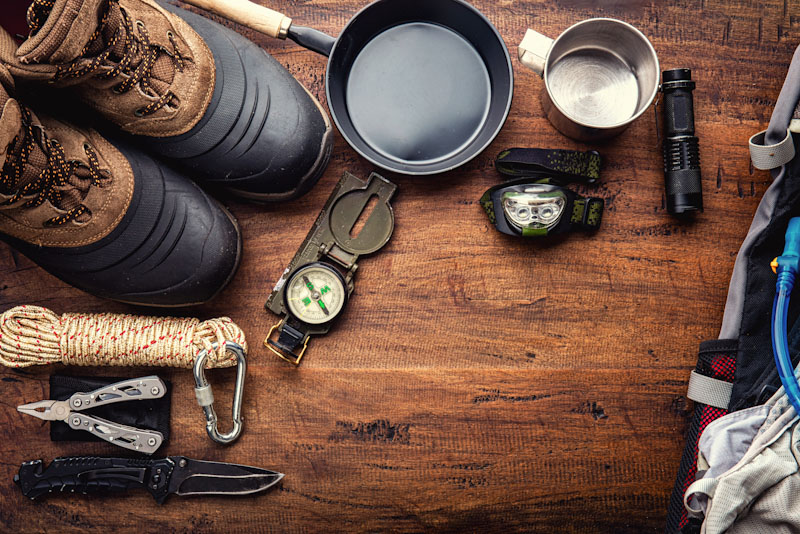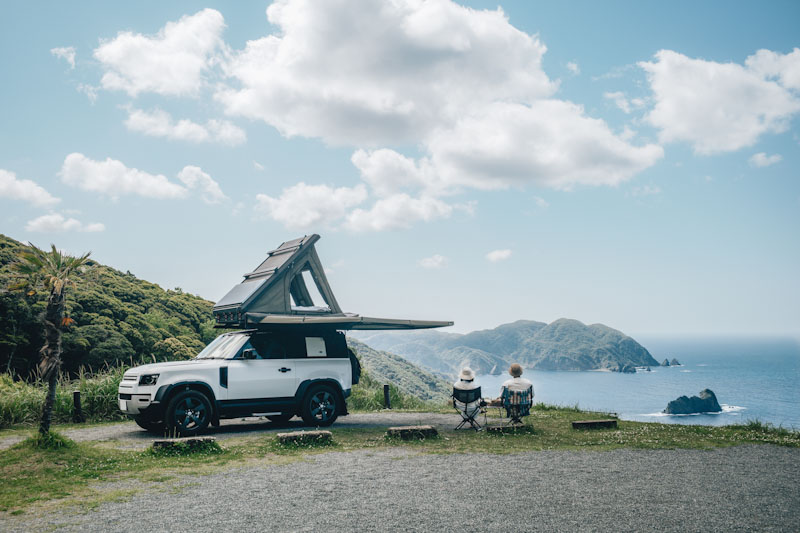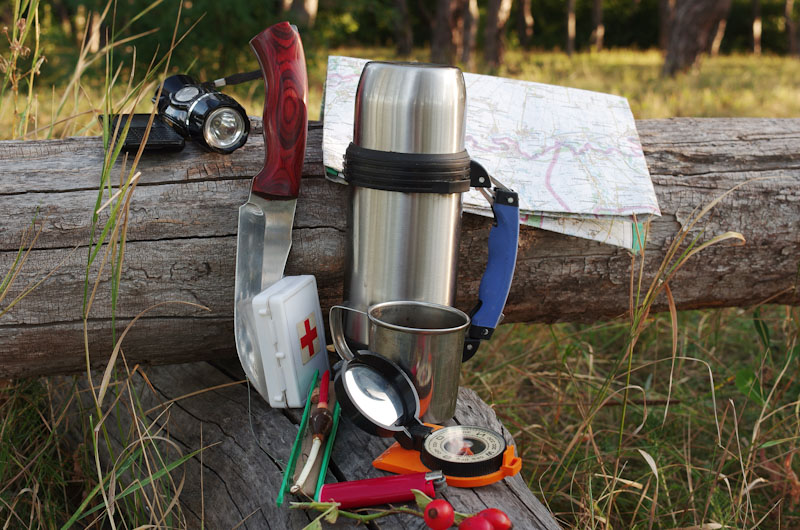If you have ever wanted to detach from the structures of society and live completely “free” from the tediousness of everyday life, you are not alone.
There is no shortage of romantic assumptions about the off-grid lifestyle. Sure, the work is difficult, but it is also considered “honest” and even “natural”.
And while there are plenty of books and resources on the Internet that tell you how to “do” off-grid living, there isn’t a whole lot on how to “prepare”. The lifestyle requires plenty of tools — some orthodox, some not — and if you are serious, you will need to know what they are to succeed.
How to use this guide
For practical reasons, this guide has been broken down into four sections or ‘goals’: Harvesting, Health, Repair, and Everyday. Each section will detail and explain what you will need in order for you to achieve each of the specific ‘goals’.
Before we dive in, it’s necessary to discern just what exactly a “tool” is. According to the Oxford dictionary definition, a tool is a device that is meant to be held in the hand, that we can use to carry out a function. So this rules out rain barrels and cisterns, for example — both are useful for collecting rainwater. But we can hardly refer to a cistern as a handheld device.
‘Obvious’ tools are also excluded. Such as those that come standard with an ordinary toolbox. The point is, this guide is there to help you prepare with tools that might otherwise have slipped your mind.
Tools for Harvesting
The word ‘harvesting’ can be applied liberally to mean extracting natural resources for consumption. This can be water, food, or wood for burning and other purposes. Outside of the toolbox, be sure to have the following:
- Long-handle round-point shovel — this multipurpose tool is very handy for chopping wood and ice, and for digging anything from ditches, to footers, to septic systems, and laying the groundwork for your gardening work.
- Cant hook — chopping down wood is one thing, moving it is another. Cant hooks are essentially long grabbing tools. With them, you can haul wood quicker and easier, saving your back in the process.
- Gardening tool set — growing an independent supply of food is notoriously tricky. It’s much more fun and practical to do it for a sense of accomplishment. That said, a simple gardening toolset will go a long way. A good one will have tools with ergonomic handles and should come with various trowels, a spray bottle, gloves, and pruning shears.
- Rotary tiller — depending on the size of your garden, it might be best to invest in a rotary tiller to save the laborious handwork. Tillers rapidly ready soil and turn it into a viable seedbed for planting.
- Buckets — another simple yet great multipurpose tool. With a bucket, you can store and transport tools, water, compost, and more.
- Tarpaulin — anyone who’s read Cormac McCarthy’s ‘The Road’ will have an idea of the importance of tarpaulin. Use it as a shelter, blanket, dust-protector, a quick-drying barrier, and, if used intelligently, to collect rainwater.
Tools for Health
An off-grid lifestyle puts us more in touch with nature. Unfortunately, that can also mean putting us in touch with more bacteria. In addition to a first aid kit — which generally just includes plasters and sterile dressings, you should have with you the following:
- Antiseptics — an antiseptic slows the growth or infection rate of microorganisms in the area where it is applied. A good example might be to put antiseptics on your hands if you plan on doing some woodwork, to prevent the chances of infection if the skin is broken.
- Soap — good old fashioned soap breaks down the membranes of viruses and washes bacteria clean off the hands. Wash your hands as regularly as possible with soap.
- Tweezers — are ideal for removing small splinters and ingrown hairs. A simple, yet completely viable multipurpose health tool.
Good health doesn’t just revolve around disease prevention. If you are living off-grid, you are almost certainly doing a lot of manual labor. Over time, without the proper tools, this labor can damage the body. In that case, it is also important to have the following:
- Safety glasses — never leave anything to chance with your eyes. It is best to get into the habit of using safety glasses in most instances.
- Earmuffs — hammering, sawing, and using power tools, in general, may not seem deafening at first. But over time the accumulated noise pollution can take its toll on your ears. Like with safety glasses, wear earmuffs as regularly as possible.
- Fire extinguisher — as the old saying goes, “it’s better to have something and not need it than to need it and not have it”. An off-grid lifestyle will probably put you at a disadvantage if a fire suddenly breaks out. In that case, you will want something to quickly extinguish it. Just remember to choose the right type for the fire that will most likely occur.
Tools for Repair
A true test of independence is the ability to fix and resolve most problems with limited outside help. A lot of repair tools come naturally under ‘ordinary’ tools (i.e. hammer, screwdrivers) and include some wood procuring tools like a chainsaw (mentioned below, in the ‘Tools for Everyday’ section).
There are too many tools and circumstances to list all of them here. Instead, here is a list of basic tools that everyone will need from time to time:
- Carjack — flat tires not only can happen, but they will also happen. Given the implied remoteness of off-grid living, and that a car is likely to be your main method of transportation, it would be wise to have a car jack.
- Duct tape — there are many different types of tape that you can buy. The highest quality is often waterproof, tear-resistant, and extremely durable. It is pretty much a certainty that you will have to resort to duct tape at some point.
- Carpenter pencils — especially useful for marking cut lines on boards, posts, wood, and more. If you ever need to engage in a little DIY repair, carpenter pencils are more than handy.
- Ropes — literally hold things together. A polypropylene rope is even better as they are very sturdy and durable. Ropes are one of the ultimate multipurpose tools.
- Electric sander — a sander renders a lot of handiwork viable by removing splinters and smoothing out the edges. You can buy ‘mini’ sanders, which resemble clothing irons. They are especially useful for sanding small and hard to reach places.
Tools for Everyday
When the first English colonists visited America there was a massive failure because no one thought to bring along the necessary everyday tools for survival. These tools aren’t immediately obvious — in that at first they seem easy to overlook in favor of other tools and forgotten about.
Catch A Glimpse of Green Beret Outdoor Survival Ingenuity
But everyday tools (or a lack of them) can make or break your off-grid lifestyle. It is very important to consider them, and properly. A pair of walking boots might not seem crucial, for instance, but without them, your risk of injury is much greater.
- Chainsaw — for obvious reasons, these motor-powered beasts are great for clearing brush, trees, cutting firewood, and even for DIY purposes.
- Work gloves — it is important to buy high-quality gloves and multiple gloves at that. Find a long-lasting, well insulated, and comfortable brand and save your hands from the misery of blisters and aches.
- Walking boots — a good pair of walking boots will last ten years. The best ones are insulated, chemical and cold weather-resistant; slip-resistant, and steel-toed. If you are doing a lot of manual work, such as preparing and carrying wood, you will want steel toes for when a plank eventually falls on them.
- Bicycle — bikes are so ingenious of a design that our descendants will likely be riding them about thousands of years into the future. They are easy to repair when they breakdown, green, and (for the same reason) never run out of petrol. A bicycle is an excellent form of relatively quick transportation.
- Solar power — infinite, renewable, free energy from the Sun. Sounds alright, doesn’t it? Nowadays you can purchase mini-briefcase solar panels to power your batteries, solar backup chargers for mobile phones, and even solar-powered water heaters that can heat enough water for a conservative shower in about four hours.
There you have it. A far from an exhaustive list, but an essential list outside of the orthodox. Living off-grid requires a “jack of all trades” kind of person and takes a lot of preparedness. The tools listed here will not address every problem, but they will come immeasurably handy as you adjust to the lifestyle.











Robert Lee | July 10, 2020
|
Come-a-long….force multiplier.
ZIPPY | July 10, 2020
|
Power4Patriots had a sale on their 1800 watt solar generator that came with two, 100 watt panels. I got it and really glad I did. For a minor shtf or even teotwawki, I’m a little closer to having what we need to survive. I also got an emp bag just in case. Now if the power goes out for an extended period of time, at least we can cook, make coffee and run the fridge/freezer, even the 1200 watt microwave. It’s a little pricey, but how much is your survival worth? My wife got a little pissed at me, but she’s ok with it now that she’s seen what it will power.
jrg | July 11, 2020
|
A lot of rural tasks require moving HEAVY stuff from here to there. A wheelbarrow, with a steel yoke and bucket and no-flat tire. If can be afforded, another yoke and tire with no bucked for hauling irregular sized loads like fire wood, which can be strapped to frame.
Thanks for this list a lot of good suggestions.
Lewis Smith | July 11, 2020
|
I have never used a shovel for chopping wood or ice….and to use a chain saw is NOT for the inexperienced….and a cant hook is not for doing anything ohter than turning logs
Normal Chuck | July 12, 2020
|
Gas/Diesel fuel along with an additive and some type of transfer pump
2 cycle oil and bar oil for the chain saw.. Maybe an extra bar,chain, and carb kit.
Premature alarm.:
Alan Hays | August 23, 2020
|
And spark plugs!
John farmer | February 9, 2021
|
We use electric battery chain saws and electric log splitter.These are charged with an off the grid solar system. We also have a separate solar water pump that pumps the water from spring to the top of property to underground storage providing gravity pressure to house. The house solar system also provides power to fans in our solar heated greenhouse. We also have a separate solar gate and solar security cameras. What would we do without the power of the sun?
Simon | July 12, 2020
|
Another use for tweezers is tick removal. Even if you don’t get Lyme from the initial bite the head can tear off during removal, embed in your flesh and leave a persistent open wound. Not a good thing when shtf.
Pamela | July 26, 2021
|
Don’t forget about non electric kitchen appliances,